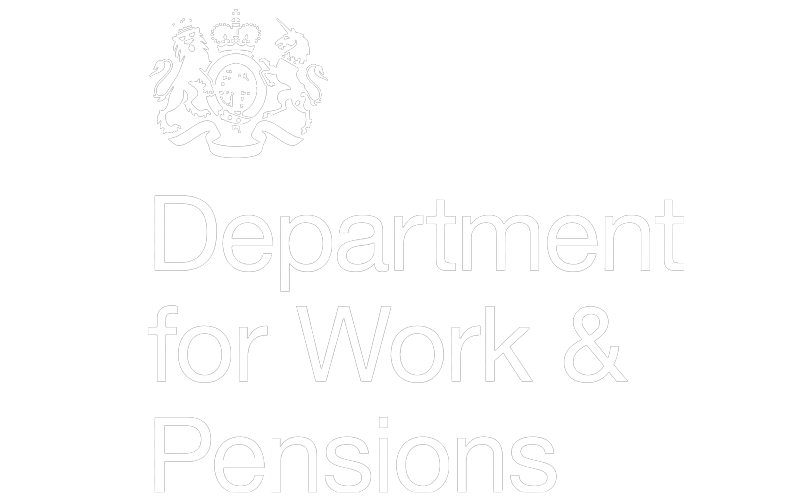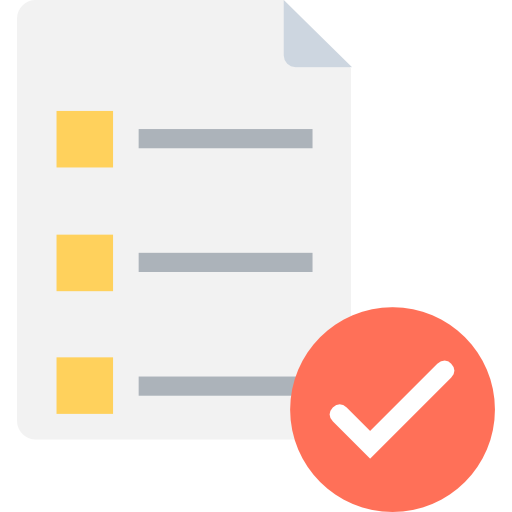Calls cost up to 7p per minute for 0845 and 0844 numbers, plus your telephone company’s network access charge.
Personal Independence Payment PIP Phone Number
We will forward you call to the Personal Independence Payment (PIP) Click to call 0845 257 3690
Help Claiming the PIP Benefit
Do you feel your condition effects your daily living and / or mobility? We can help you understand the criteria of claiming Personal Independence Payment (PIP). It is important to understand how the DWP makes a decision, so you can prepare for your claim, assessment and gather your evidence. To get a PIP claim form, you can call 0845 257 3690, and we will forward your call to the DWP.
Help with the PIP Claim Form
It is important to get the correct information on your ‘How your disability affects you’ form. Get as much detailed information as possible down in each section. For example, it is essential that if you have difficulty with a daily task for just part of the day, you may still get points. Even if you can manage it the rest of the day.
Also, if a disability aid would help you do the task without the need for additional help, this may reduce your points!
Stress in your form, if doing a task gives you pain, takes more than twice the usual time to do the task or puts you or others at risk.
If you would like to know more about PIP, see our Personal Independence Payment page or call 0845 257 3690.

Click to view PIP Scoring for Daily Living
Valid from 16th March 2017
Taken from www.mybenefitsandwork.co.uk
DAILY LIVING ACTIVITIES
1. Preparing food.
a. Can prepare and cook a simple meal unaided. 0 points.
b. Needs to use an aid or appliance to be able to either prepare or cook a simple meal. 2 points.
c. Cannot cook a simple meal using a conventional cooker but is able to do so using a microwave. points. 2 points
d. Needs prompting to be able to either prepare or cook a simple meal. 2 points.
e. Needs supervision or assistance to either prepare or cook a simple meal. 4 points.
f. Cannot prepare and cook food. 8 points.
2. Taking nutrition.
a. Can take nutrition unaided. 0 points.
b. Needs –
(i) to use an aid or appliance to be able to take nutrition; or
(ii) supervision to be able to take nutrition; or
(iii) assistance to be able to cut up food. 2 points.
c. Needs a therapeutic source to be able to take nutrition. 2 points.
d. Needs prompting to be able to take nutrition. 4 points.
e. Needs assistance to be able to manage a therapeutic source to take nutrition. 6 points.
f. Cannot convey food and drink to their mouth and needs another person to do so. 10 points.
3. Managing therapy or monitoring a health condition.
a. Either –
(i) does not receive medication or therapy or need to monitor a health condition; or
(ii) can manage medication or therapy or monitor a health condition unaided. 0 points.
b. Needs any one or more of the following –
(i) to use an aid or appliance to be able to manage medication;
(ii) supervision, prompting or assistance to be able to manage medication.
(iii) supervision, prompting or assistance to be able to monitor a health condition. 1 point.
c. Needs supervision, prompting or assistance to be able to manage therapy that takes no more than 3.5 hours a week. 2 points.
d. Needs supervision, prompting or assistance to be able to manage therapy that takes more than 3.5 but no more than 7 hours a week. 4 points.
e. Needs supervision, prompting or assistance to be able to manage therapy that takes more than 7 but no more than 14 hours a week. 6 points.
f. Needs supervision, prompting or assistance to be able to manage therapy that takes more than 14 hours a week. 8 points.
4. Washing and bathing.
a. Can wash and bathe unaided. 0 points.
b. Needs to use an aid or appliance to be able to wash or bathe. 2 points.
c. Needs supervision or prompting to be able to wash or bathe. 2 points.
d. Needs assistance to be able to wash either their hair or body below the waist. 2 points.
e. Needs assistance to be able to get in or out of a bath or shower. 3 points.
f. Needs assistance to be able to wash their body between the shoulders and waist. 4 points.
g. Cannot wash and bathe at all and needs another person to wash their entire body. 8 points.
5. Managing toilet needs or incontinence.
a. Can manage toilet needs or incontinence unaided. 0 points.
b. Needs to use an aid or appliance to be able to manage toilet needs or incontinence. 2 points.
c. Needs supervision or prompting to be able to manage toilet needs. 2 points.
d. Needs assistance to be able to manage toilet needs. 4 points.
e. Needs assistance to be able to manage incontinence of either bladder or bowel. 6 points.
f. Needs assistance to be able to manage incontinence of both bladder and bowel. 8 points.
6. Dressing and undressing.
a. Can dress and undress unaided. 0 points.
b. Needs to use an aid or appliance to be able to dress or undress. 2 points.
c. Needs either –
(i) prompting to be able to dress, undress or determine appropriate circumstances for remaining clothed; or
(ii) prompting or assistance to be able to select appropriate clothing. 2 points.
d. Needs assistance to be able to dress or undress their lower body. 2 points.
e. Needs assistance to be able to dress or undress their upper body. 4 points.
f. Cannot dress or undress at all. 8 points.
7. Communicating verbally.
a. Can express and understand verbal information unaided. 0 points.
b. Needs to use an aid or appliance to be able to speak or hear. 2 points.
c. Needs communication support to be able to express or understand complex verbal information. 4 points.
d. Needs communication support to be able to express or understand basic verbal information. 8 points.
e. Cannot express or understand verbal information at all even with communication support. 12 points.
8. Reading and understanding signs, symbols and words.
a. Can read and understand basic and complex written information either unaided or using spectacles or contact lenses. 0 points.
b. Needs to use an aid or appliance, other than spectacles or contact lenses, to be able to read or understand either basic or complex written information. 2 points.
c. Needs prompting to be able to read or understand complex written information. 2 points.
d. Needs prompting to be able to read or understand basic written information. 4 points.
e. Cannot read or understand signs, symbols or words at all. 8 points.
9. Engaging with other people face to face.
a. Can engage with other people unaided. 0 points.
b. Needs prompting to be able to engage with other people. 2 points.
c. Needs social support to be able to engage with other people. 4 points.
d. Cannot engage with other people due to such engagement causing either –
(i) overwhelming
psychological distress to the claimant; or
(ii) the claimant to exhibit behaviour which would result in a substantial risk of harm to the claimant or another person. 8 points.
10. Making budgeting decisions.
a. Can manage complex budgeting decisions unaided. 0 points.
b. Needs prompting or assistance to be able to make complex budgeting decisions. 2 points.
c. Needs prompting or assistance to be able to make simple budgeting decisions. 4 points.
d. Cannot make any budgeting decisions at all. 6 points.
Personal Independence Payment (PIP) daily living component points scores
To get an award of the daily living component, you need to score:
8 points for the standard rate
12 points for the enhanced rate
For daily living, the points need to be scored from activities 1-10 above.
You can only score one set of points from each activity, if two or more apply from the same activity only the highest will count. So, for example, if:
4 d. Needs assistance to groom. 2 points
4 g. Needs assistance to bathe. 4 points
both apply you will receive only the 4 points for the ‘Bathing and grooming’ activity. These can then be added to points for other activities, such as ‘Dressing and undressing’
Click to view PIP Scoring Mobility
Valid from 16th March 2017
Taken from www.mybenefitsandwork.co.uk
MOBILITY ACTIVITIES
1. Planning and following journeys.
a. Can plan and follow the route of a journey unaided. 0 points.
b. Needs prompting to be able to undertake any journey to avoid overwhelming psychological distress to the claimant. 4 points.
c. For reasons other than psychological distress, cannot plan the route of a journey. 8 points.
d. For reasons other than psychological distress, cannot follow the route of an unfamiliar journey without another person, assistance dog or orientation aid. 10 points.
e. Cannot undertake any journey because it would cause overwhelming psychological distress to the claimant. 10 points.
f. For reasons other than psychological distress, cannot follow the route of a familiar journey without another person, an assistance dog or an orientation aid. 12 points.
2. Moving around.
a. Can stand and then move more than 200 metres, either aided or unaided. 0 points.
b. Can stand and then move more than 50 metres but no more than 200 metres, either aided or unaided. 4 points.
c. Can stand and then move unaided more than 20 metres but no more than 50 metres. 8 points.
d. Can stand and then move using an aid or appliance more than 20 metres but no more than 50 metres. 10 points.
e. Can stand and then move more than 1 metre but no more than 20 metres, either aided or unaided. 12 points.
f. Cannot, either aided or unaided, –
(i) stand; or
(ii) move more than 1 metre. 12 points.
Personal Independence Payment (PIP) Mobility Component Points Scores
To get an award of the mobility component you need to score:
8 points for the standard rate
12 points for the enhanced rate
For mobility, the points need to be scored from mobility activities 1-2 above.
As with daily living above, you only score the highest points that apply to you from each activity, but you can add points from activities 1 and 2 together to reach your final total.
Alternatively, you can use an online calculator to see if you would be eligible to claim PIP, using your own answers. Click here for The Benefits and Work Guide Calculator.

